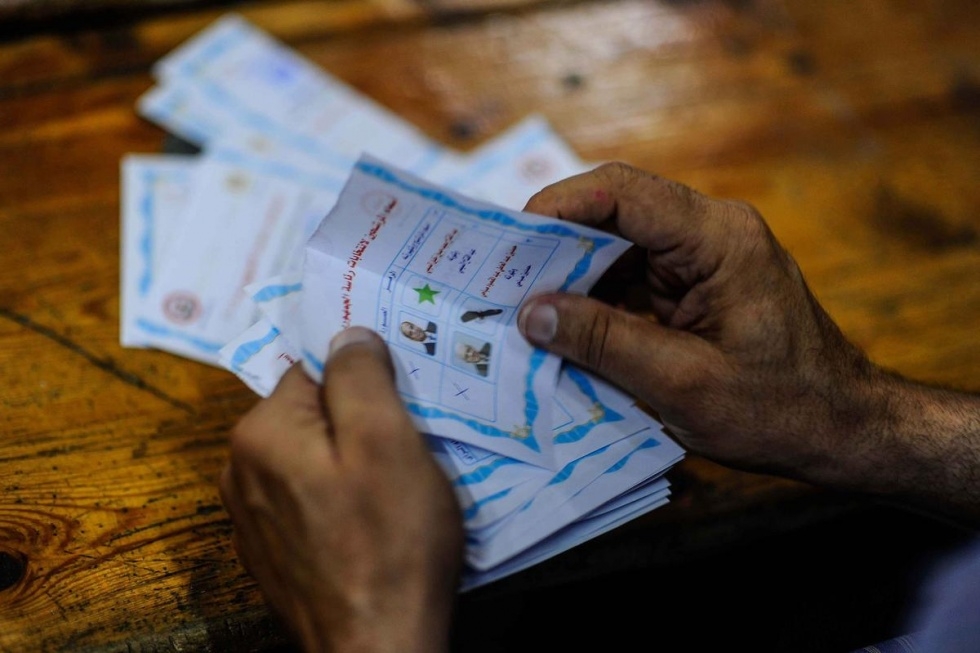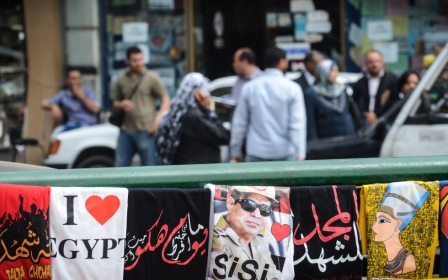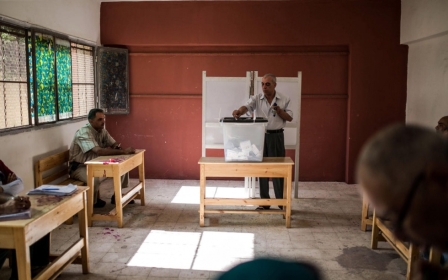The bubble bursts in Egypt

For three days, the Egyptian state pleaded with, demanded, threatened, cajoled, bribed voters to turn up at the polls. Egyptians were warned it was nothing less than a national duty to vote and they could be fined 500 Egyptian pounds ($70) for not doing so. They were told that Egypt would become Libya or Syria if they did not vote. The second day of voting was made a national holiday, and travel was made free to encourage voters to return to their constituencies. The TV anchors panicked and became hysterical. Voting was extended into a third day.
Still they did not show up. An AFP crew touring Cairo's polling stations found deserted halls. CNN reported likewise. Photos appeared on Twitter showing election officials asleep at their desks.
Interviewed on Good Morning Egypt, Najeeb Jibraeel, a human-rights lawyer who heads the Egyptian Union for Human Rights protested on air as TV correspondents reported large crowds coming to the election stations to vote. Jibraeel said: "You had correspondents from Giza, Kafr Alsheikh and Suwais, and (behind them) we only saw one veiled woman voting in all three stations. He said it was not possible to "laugh" at the Egyptian people any more".
By the end of the second day, the interim prime minister Ibrahim Mahlab, said that the turnout had exceeded 30 percent, and yet by the end of the third that had risen to 46 percent, leaving many to wonder how these figures could have been achieved in one day. Hamdeen Sabbahi, the only challenger in the race, said the claimed turnout figures were an insult to the intelligence of the Egyptian people.
While some pollsters could be found who said these figures were credible, most monitoring organizations did not find them to be so. Estimates of the actual turnout ranged from figures as low as 10 percent, which would be 5.5 million votes, to 15 percent. The Arab Observatory for Rights and Freedoms put the turnout at 11.92 percent which equates to 6,425,989 voters. It reported numerous election violations and fraud. An interim statement published on behalf of the European Union monitors made no comment on the reliability of turnout figures claimed by the pro-government judiciary.
New MEE newsletter: Jerusalem Dispatch
Sign up to get the latest insights and analysis on Israel-Palestine, alongside Turkey Unpacked and other MEE newsletters
Whichever set of figures you believe, one thing emerges loud and clear from a result like this. The bubble has burst. The idea that a "vast majority" of Egyptians ousted Mohamed Morsi on 30 June and Abdel Fatah al-Sisi stepped up by popular request to take over on 3 July no longer holds true. If they ever existed in the numbers claimed in 2013, these millions of Egyptians no longer exist today. A "vast majority" behind Sisi has now shrunk to a "vocal minority". Almost entirely absent from this throng and from the television pictures of Sisi's supporters are Egypt's youth. They make up one quarter of the population and over half of them are impoverished.
A few days before the election the US polling organization, Pew published a remarkable poll which found that only 54 percent of Egyptians said they favored the military takeover; and while its popularity has declined, 38 percent of Egyptians still have a favorable impression of the Muslim Brotherhood, which is now officially branded as a terrorist organization. This means that despite everything that has happened to them this year, mass arrest, mass death sentences, the support for the Brotherhood has remained constant. Pew found that dissatisfaction in Egypt was back to pre-revolutionary levels.
The central plank of Sisi's legitimacy - the myth that a nationalist leader rose phoenix like from the ashes of Morsi's presidency by popular demand - is now crumbling under his feet. If indeed less than 20 percent of eligible voters cast their vote, Egypt is right the way back to 2010, when no matter how few voters turned up, Mubarak's National Democratic Party triumphed nonethless. The Economist reported at the time the turnout estimates of civil rights groups of between 10 to 20 percent of voting age.
Elections like these paved the way for the revolution of 25 January, three months later. Sisi is on no firmer ground now than Mubarak was then.
Indeed Sisi is more exposed today because since 3 July, he has jettisoned the liberal and secular leaders who helped him to power. He has burned away the civilian camouflage he so desperately needs. Where is Mohamed El-Baradei now? What has happened to the National Salvation Front, which is also barely mentioned? Amr Moussa is a backroom figure. And what of Tamarod , now that one of its founders Moheb Doss has admitted publicly that they were used by the Egyptian security services: "How did we go from such a small thing, five guys trying to change Egypt, to the movement which brought tens of millions to the street to get rid of the Brotherhood? The answer is we didn't. I understand now it wasn't us, we were being used as the face of what something bigger than us," said Doss, who now has nothing to do with the Tamarod movement, or political life in Egypt. "We were naïve, and we were not responsible."
Go back to 30 June and all of these virtual organisations were portrayed as significant forces in a new non-Islamist constellation. They turned out to be little more than the tools of carefully crafted campaign to disguise a counter revolution as a continuation of the first one in 25 January. On 30 June, Egypt's secular and liberal politicians proved themselves to be useful idiots in the true Stalinist sense of the phrase. Egyptian voters have shown this week that they are not as easily fooled.
- David Hearst is editor-in-chief of Middle East Eye. He was chief foreign leader writer of The Guardian, former Associate Foreign Editor, European Editor, Moscow Bureau Chief, European Correspondent, and Ireland Correspondent. He joined The Guardian, from The Scotsman, where he was education correspondent.
Photo credit: Vote counting gets underway in Egypt's presidential election in Cairo on May 28 (AA)
Middle East Eye delivers independent and unrivalled coverage and analysis of the Middle East, North Africa and beyond. To learn more about republishing this content and the associated fees, please fill out this form. More about MEE can be found here.





